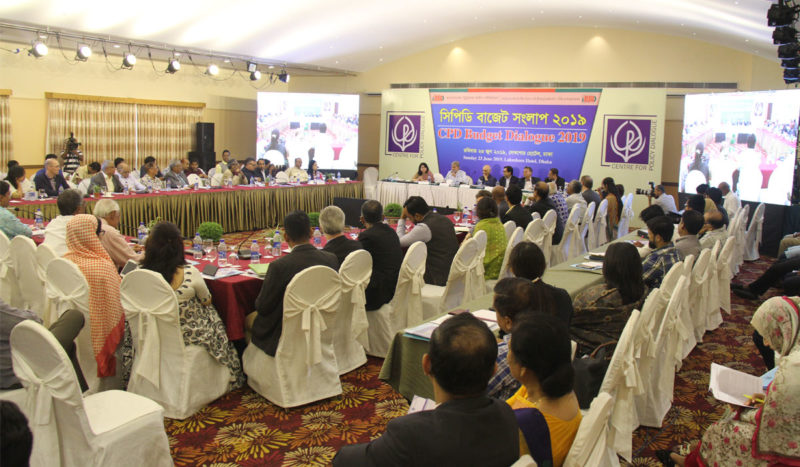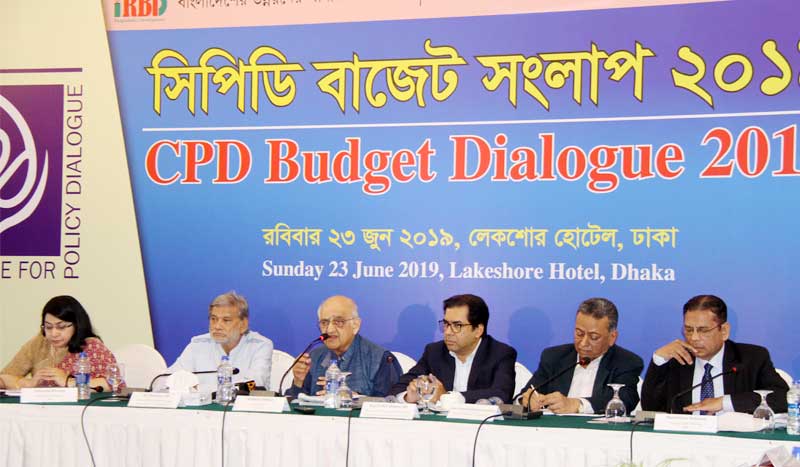
The proposed National Budget for FY2019-20 has made a number of promises including generating additional 3 crore employment and expanding tax base by 1 crore, without any concrete roadmap to achieve these targets. Moreover, emerging challenges in the economic management have largely remained unaddressed in the proposed budget and also the budget lacks indication of any special efforts to rectify the longstanding structural marginalisation of deprived sectors.
These are some of the observations that came up at the CPD Budget Dialogue 2019. The dialogue held at Lakeshore Hotel on 23 June 2019, was organised as a part of the CPD’s flagship programme Independent Review of Bangladesh’s Development (IRBD). Dr Fahmida Khatun, Executive Director, CPD, made the keynote presentation titled “An Analysis of the National Budget for FY2019-20”. Mr M A Mannan, MP, Hon’ble Minister for Planning, Government of Bangladesh was present as the Chief Guest at the dialogue. Mr Kazi Nabil Ahmed, MP, Member, Parliamentary Standing Committee, Ministry of Finance, and Mr Amir Khosru Mahmud Chowdhury, former Minister for Commerce attended the programme as Special Guests. Professor Rehman Sobhan, Chairman, CPD chaired the event, while Professor Mustafizur Rahman, Distinguished Fellow, CPD, moderated the session. CPD also launched a research report titled, “The First 100 Days of the New Government: Tracking Electoral Pledges and Implications of the National Budget for FY2019-20”, at the event.
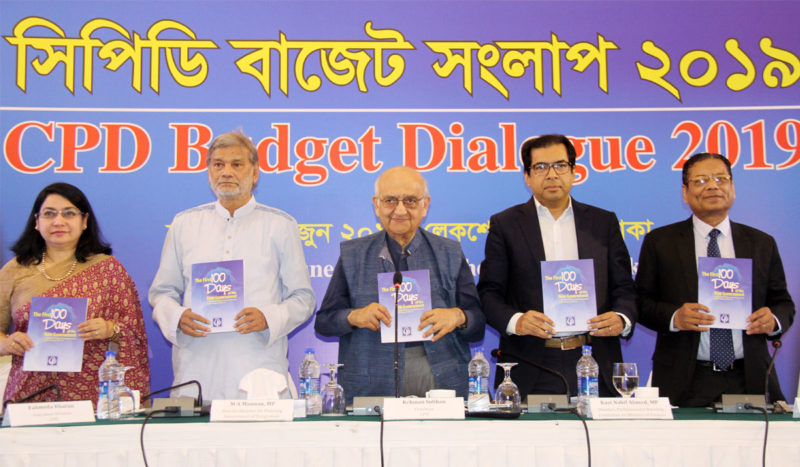
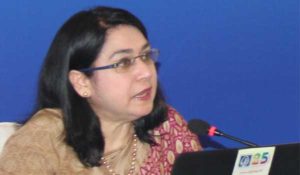 In her presentation, Dr Khatun highlighted some of the key findings from CPD’s in-depth analysis of the proposed budget, which was presented in a media briefing on the day next to budget presentation. Dr Khatun stated that in the fiscal framework for Budget FY20, revenue is projected to grow faster than public expenditure, and the development expenditure is programmed to grow faster than operating expenditure – all of these seems grammatically correct. Revenue mobilisation trends in the recent past, however, presents a different scenario. CPD estimates that the revenue collection of FY20 will fall significantly short of the target. In addition, she also raised concerns over sluggish improvement in total investment (as % of GDP), and the growth is mostly due to public investment. Contribution of private investment in FY19 was low and the targets for FY20 are set even lower.
In her presentation, Dr Khatun highlighted some of the key findings from CPD’s in-depth analysis of the proposed budget, which was presented in a media briefing on the day next to budget presentation. Dr Khatun stated that in the fiscal framework for Budget FY20, revenue is projected to grow faster than public expenditure, and the development expenditure is programmed to grow faster than operating expenditure – all of these seems grammatically correct. Revenue mobilisation trends in the recent past, however, presents a different scenario. CPD estimates that the revenue collection of FY20 will fall significantly short of the target. In addition, she also raised concerns over sluggish improvement in total investment (as % of GDP), and the growth is mostly due to public investment. Contribution of private investment in FY19 was low and the targets for FY20 are set even lower.
Referring to the keynote speaker, Mr Amir Khosru Mahmud Chowdhury mentioned that the private investment is the driver of growth. He observed that the continued low private investment and low level of employment generation in the economy do not justify the GDP growth figures in FY19 and also the target set for FY20.
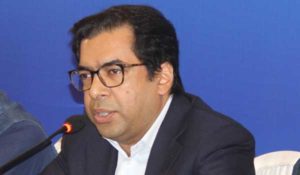 The other Special Guest, Mr Kazi Nabil Ahmed, pointed out that the budgetary allocations for education and health appear low because they are spread throughout different ministries and not counted under these specific sectors alone. Mr Arshad Jamal (Dipu), Vice President, Bangladesh Garments Manufacturers and Exporters Association (BGMEA), informed that the BGMEA is willing to help government to run a pilot test of the government’s plan for pension scheme and health insurance for all (including workers).
The other Special Guest, Mr Kazi Nabil Ahmed, pointed out that the budgetary allocations for education and health appear low because they are spread throughout different ministries and not counted under these specific sectors alone. Mr Arshad Jamal (Dipu), Vice President, Bangladesh Garments Manufacturers and Exporters Association (BGMEA), informed that the BGMEA is willing to help government to run a pilot test of the government’s plan for pension scheme and health insurance for all (including workers).
The budget has failed to address the challenges of inequality in the society, said Barrister Rumeen Farhana, Member of Parliament. Referring to different sources, Barrister Farhana expressed her deep concerns over growing inequality by mentioning that the number of wealthy people is increasing in the country against the large number of ultra-poor.
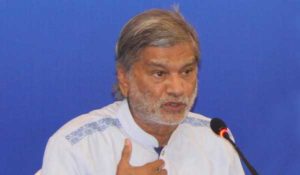 The Chief Guest, Mr Mannan, in his speech congratulated CPD on presenting another extensive analysis of the proposed budget. He agreed to the concerns raised by CPD such as data discrepancy and lack of transparency and accountability in the budget. He, however, stated that the situation is getting better. The Hon’ble Minister reminded the dialogue that the ultimate goal of this government is poverty alleviation and the government aims to do it through improvement in infrastructure, power, education and health. “Our government is concentrating on these sectors”, he added.
The Chief Guest, Mr Mannan, in his speech congratulated CPD on presenting another extensive analysis of the proposed budget. He agreed to the concerns raised by CPD such as data discrepancy and lack of transparency and accountability in the budget. He, however, stated that the situation is getting better. The Hon’ble Minister reminded the dialogue that the ultimate goal of this government is poverty alleviation and the government aims to do it through improvement in infrastructure, power, education and health. “Our government is concentrating on these sectors”, he added.
Professor Sobhan, shared his experience of being involved in preparation of several manifestos. He sadly mentioned that, in this country promises in the manifestos are not taken seriously. He therefore, urged the new government to ensure proper implementation of the pledges in their election manifesto.
A student of the Department of Economics from the University of Dhaka, raised a genuine question. He felt that allocating Tk. 100 crore to encourage youth entrepreneurship contradicts with the proposals to increase VAT on social media based business, because most young entrepreneurs are interested in e-business.
The floor comprising academicians, economists, researchers, diplomats, journalists and youth representatives, among others, actively participated in the dialogue.
